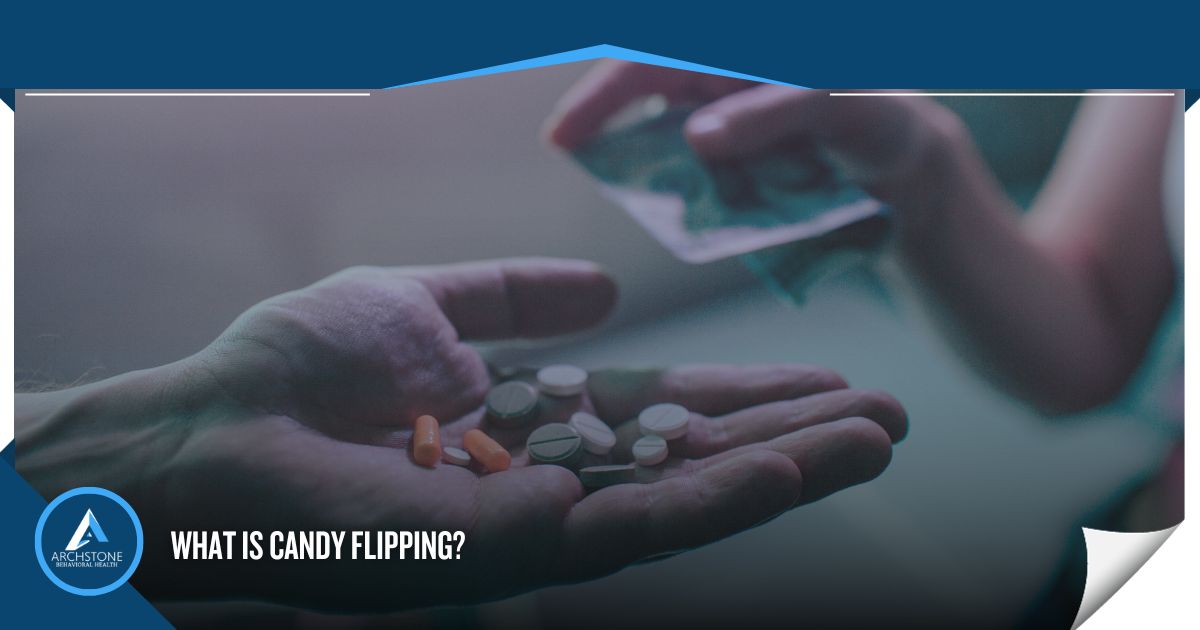What is Candy Flipping?
Get Help Now

Candy flipping is a term that means mixing LSD (acid) and MDMA (ecstasy). People who use these drugs together may experience dangerous side effects and increase their risk for complications and harm. In this article, we’ll explore what candy-flipping is, the effects of LSD and ecstasy, and how to recognize the need for substance use disorder treatment.
If you or someone you love struggle with substance use and addiction, or you want to learn more about the risks of candy-flipping, reach out to the dedicated specialists at Archstone Behavioral Health now. Our intake specialists can tell you about our comprehensive treatment programs, answer questions, or help you set up an intake assessment. Call today to get started toward the healthier, sober life you deserve.
What is Candy-Flipping?
Candy-flipping is a term that describes using MDMA and LSD together. People may take these drugs together to achieve a more intense “high.” Users typically take LSD first, allowing the effects of the psychedelic drug to develop. About four hours later, they take MDMA.
Candy-flipping can allow people to experience intense pleasurable effects of both drugs, such as elevated mood and euphoria. Users may find that they can extend or improve the effects of LSD when the effects of MDMA kick in, and they may increase the duration of the drugs’ pleasant effects.
But candy-flipping is a highly dangerous practice, and the pleasant effects are generally short-lived. LSD and MDMA have their own risks, and using these drugs at the same time can increase the likelihood of complications and long-term harm.
It’s essential to understand the effects and risks of MDMA and LSD to understand the dangers of candy-flipping.
What is MDMA?
MDMA is a synthetic illicit drug that has stimulant and hallucinogenic effects. Users may experience euphoria, heightened senses, and increased energy, along with other pleasurable effects.
MDMA is also known as:
- Molly
- Ecstasy
- X
- Love drug
- Hug drug
- Smarties
- E-bomb
- Adam
- Beans
- Cadillac
- Candy
MDMA users may experience unwanted, unpleasant side effects, including:
- Confusion
- Nausea
- Loss of appetite
- Impaired judgment
- Involuntary muscle clenching, especially in the jaw
- Depersonalization
- High blood pressure
- Panic attacks
- Seizures
- Loss of consciousness
- Aggression
- Depression
People who use MDMA may be at increased risk of overheating, dehydration, and injuries from accidents.
What is LSD?
LSD is a synthetic drug derived from a type of fungus called ergot. Some common street names for LSD include:
- Acid
- Lucy
- Blotter
- Paper
- Alice
- Microdots
- California sunshine
- Purple haze
- Dots
LSD is a psychedelic drug. Its effects include:
- Altered perception
- Changes in mood and thinking
- Visual and auditory hallucinations
- Distorted sense of space and time
People may also experience unpleasant side effects, including:
- Rapid breathing
- Nausea
- Disturbing hallucinations
- Poor concentration
- Dilated pupils
- Confusion
- Paranoia
- Psychosis
Tiny amounts of LSD are capable of producing powerful effects. It is typically diluted and added to paper, sugar cubes, or sheets of gelatin that users can dissolve orally.
People may engage in dangerous or erratic behaviors if they take a large dose of LSD. Toxicity can occur if people overdose on LSD or combine it with other substances.
The Effects of Candy-Flipping
People who practice candy-flipping are at risk of unwanted, intensified side effects of both MDMA and LSD. People may experience:
- Disturbing visual and auditory hallucinations
- Elevated blood pressure
- Paranoia
- Confusion
- Dizziness
- Dangerously elevated body temperature
- Excessive sweating
- Impaired judgment
- Mood swings
- Aggression
The effects of candy-flipping may last up to 24 hours, depending on how much of each drug a person uses. When the initial effects of LSD and MDMA begin to wear off, many people experience a “comedown” period that often includes uncomfortable, sometimes dangerous effects, including:
- Poor concentration
- Memory problems
- Irritability
- Aggression
- Panic attacks
- Paranoia
- Sexual dysfunction
- Loss of appetite
People may also experience cravings for MDMA after candy-flipping. Cravings for a substance may indicate psychological or physical dependence. It is important to watch for signs of dependence and addiction and seek treatment to overcome these conditions.
Do I Need Substance Use Disorder Treatment?
Getting treatment for substance abuse and addiction can give you a fresh start toward a healthier, more fulfilling life. The first step in getting help is to recognize a problem.
Some signs of a substance use disorder include:
- Spending a lot of time getting, using, and coming down from using drugs
- Neglecting your hobbies, relationships, and responsibilities
- Experiencing cravings or withdrawal symptoms if you stop taking the substance
- Needing to use more of a drug to get the desired effects
- Wanting to stop using drugs but finding it impossible to stop
No one chooses to live with substance abuse or addiction. These conditions are complex and require compassionate, holistic treatment. With the right kind of treatment and ongoing support, you can work to put addiction behind you and embrace a healthier, sober lifestyle.
Learn More About the Dangers of Candy-Flipping
If you or someone you love wants to know more about the risks associated with candy-flipping, or you need comprehensive treatment and support to overcome substance abuse, contact the specialists at Archstone Behavioral Health now. Our intake staff can answer your questions, help you find the right level of care to meet your needs, and schedule an intake.
Don’t wait another day for the care and support you deserve. Take the first step of your recovery journey by calling us now.